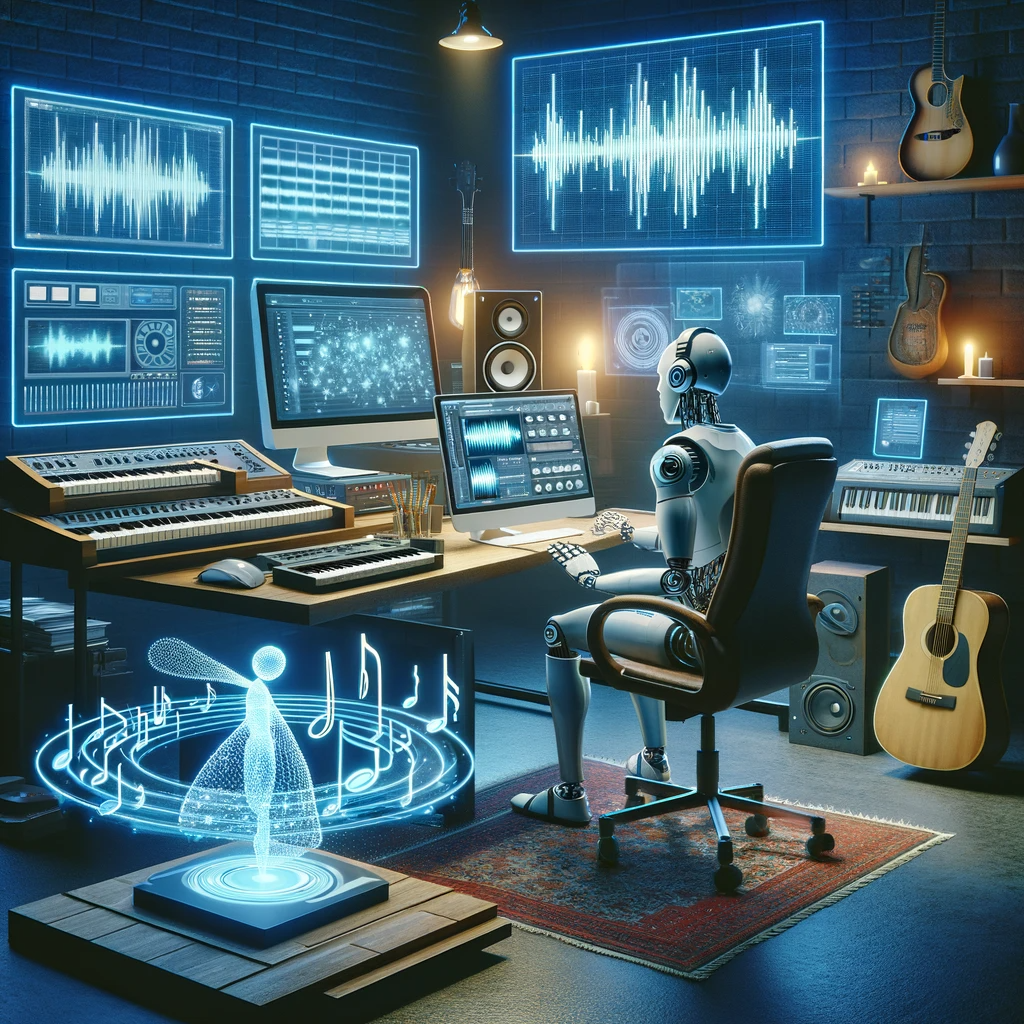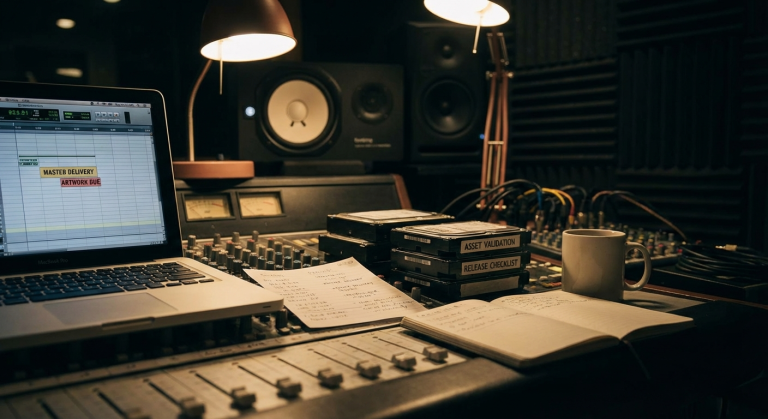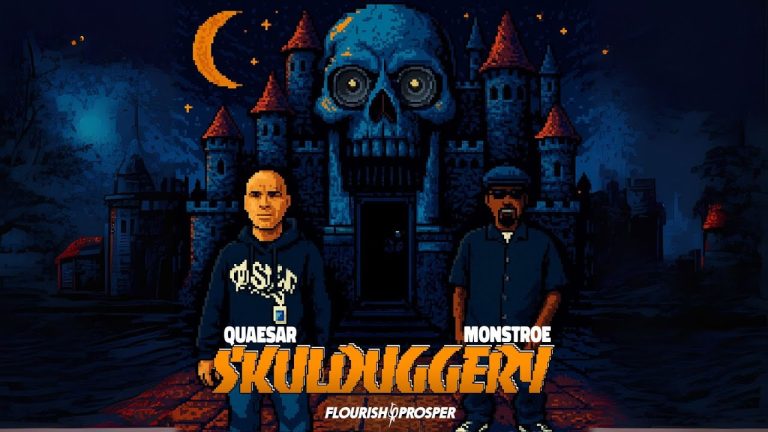Understanding the Concept of AI-Generated Music
The concept of AI-generated music refers to the process of creating musical content using artificial intelligence technologies. This nascent field leverages machine learning algorithms and deep learning networks that can analyze vast amounts of musical data, learn patterns, and create original compositions.
Artificial Intelligence and Music Creation Process
AI music generation involves using computer systems programmed with AI algorithms to compose music without human intervention. These AI systems are usually trained on large datasets containing a variety of musical pieces. The AI uses this input to learn about different patterns, chords, melodies, rhythms, and styles present in the music. After training, these AI models can then generate entirely new and original musical compositions or emulate specific styles based on their learning.
It’s worth noting that there are different approaches to AI music generation. Some systems work by creating music note-by-note, while others generate music based on larger blocks of compositions.
Machine Learning Algorithms in AI Music Production
At the core of AI music generation are machine learning algorithms. Machine learning is a subtype of AI that gives machines the ability to learn from data and improve over time. With regard to music, these algorithms are capable of identifying patterns and characteristics in a wide range of compositions. Some commonly used algorithms include Recurrent Neural Networks (RNNs), Long Short Term Memory (LSTM) networks, and Generative Adversarial Networks (GANs).
RNNs, for instance, are particularly good at processing sequences, making them ideal for music composition, where one note often depends on the ones before it. LSTM networks, a special kind of RNN, excel at learning long-term dependencies, and so they can capture the thematic development of a musical piece. GANs approach the task differently: they consist of two neural networks competing against each other, one that generates music and one that evaluates its quality.
The Role of Deep Learning in AI-Generated Music
Deep learning has brought significant advancements to the field of AI music composition. As a subfield of machine learning, deep learning uses artificial neural networks designed to mimic the human brain’s operation. These models can process and analyze numerous layers of abstract data, allowing them to identify more complex patterns in music.
For instance, convolutional neural networks (CNNs), a type of deep learning model, are used for feature extraction in music generation. They can identify and extract significant features from complex musical datasets. This ability to recognize and learn intricate patterns makes deep learning particularly suited to creating innovative, original music.
Overall, the concept of AI-generated music demonstrates a fascinating convergence of art and science, bridging the gap between the creative spontaneity of humans and the precision of machine learning algorithms. Its continued development promises to revolutionize the way we create and consume music.
Historical Journey and Progress of AI in Music Creation
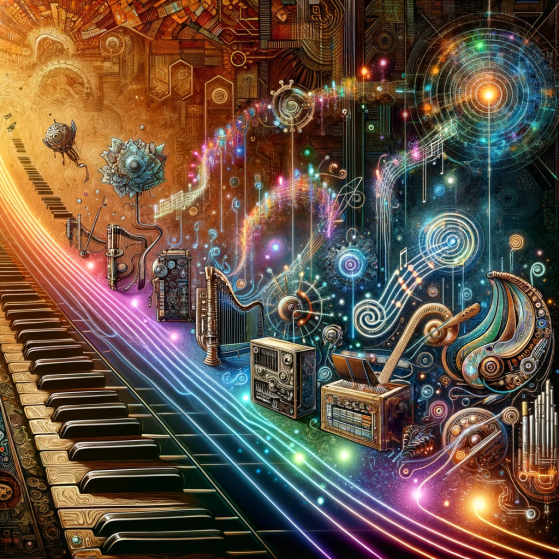
The Origins of AI in Music Composition
AI in music creation has its roots in the mid-20th century with experiments in algorithmic composition. Early pioneers of AI music include Iannis Xenakis and Lejaren Hiller who utilized mathematical algorithms and computer programs to generate musical content. Xenakis’ compositions, for instance, were based on mathematical models, using probabilities for determining the arrangement of sound structures.
The 1980s brought about the advent of MIDI (Musical Instrument Digital Interface) technology, paving the way for computers to communicate and interact with traditional musical instruments directly. This period also saw the development of intelligent musical systems such as David Cope’s ‘Emmy’ (Experiments in Musical Intelligence), a program designed to create original compositions in the style of classical composers.
The Progression of AI in Music Creation
In the late 1990s and early 2000s, computational intelligence started becoming more sophisticated. AI techniques like machine learning and neural networks began to be applied to music creation, leading to the development of software that could not only compose original music but also learn and improve over time.
A significant milestone in this era was Sony’s Flow Machines project, which used machine learning algorithms to analyse vast amounts of musical data. In 2016, it ended up producing ‘Daddy’s Car’, the first pop song fully composed by an AI.
Current Landscape of AI in Music Generation
Fast forward to today, the advancements in deep learning and cloud computing have opened unprecedented avenues for AI in music creation. Generative Pre-trained Transformer 3 (GPT-3), developed by OpenAI, can generate harmonically coherent pieces with minimal user input, indicating the paradigm shift in the role of AI in music creation. Similarly, platforms like Jukin and Amper Music are leveraging AI to provide artists with tools for efficient and creative music production.
Notably, AIVA (Artificial Intelligence Virtual Artist), an AI composer which was officially recognised as a composer by France’s SACEM (Society of Authors, Composers, and Publishers of Music), signifies a significant turning point in legitimizing AI’s role in the music industry.
So, the historical journey of AI in music creation has seen it evolve from simple algorithmic experiments to sophisticated systems capable of composing, learning and collaborating with humans. Although the implications of this progress are vast, it undeniably marks a new chapter in the history of music creation.
The Science and Technology Behind AI-Driven Music
Artificial Intelligence and Music Composition
Artificial Intelligence (AI) has been central to innovations in various industries, and the field of music is no exception. AI-driven music, at its most basic level, involves systems designed to imitate and innovate within the realm of music composition. These AI systems learn from a large database of songs and compositions, understanding various aspects like pitch, harmony, rhythm, and timbre.
The first step in this process is data preprocessing, during which musical notes and chords are transformed into a format that the AI algorithm can understand. Next, machine learning techniques like recurrent neural networks (RNNs) or long short-term memory (LSTM) networks are employed to train the system on this preprocessed data.
By recognizing patterns and understanding the structure of music, these algorithms generate original compositions that reflect the styles they’ve been trained on.
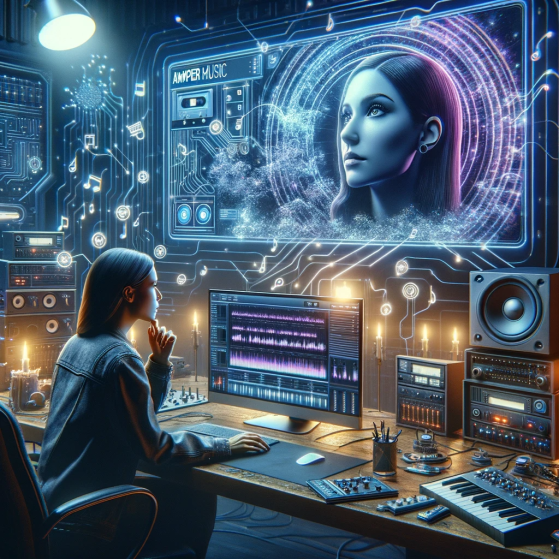
The Role of Deep Learning
Deep learning, a subfield of machine learning, plays a significant role in developing AI-powered music systems. It employs artificial neural networks with multiple layers – or ‘deep’ networks – to learn complex patterns from large amounts of data. The more data it’s fed, the more accurate and nuanced its output becomes. In the case of music, deep learning models like WaveNet or Transformer are used to create high-fidelity audio by generating raw audio waveforms and predicting subsequent sound samples.
These models can not only imitate existing music styles but also create entirely new ones. Moreover, they’re effective at composing music with meta-features such as emotional tone or specific genre characteristics.
Tech Tools for AI-Driven Music
Many AI-based music tools have emerged to assist in music creation. Magenta, an open-source project by Google’s Brain team, explores the role of machine learning in the process of creating art and music. Its TensorFlow-based tools enable developers and musicians to experiment with machine learning models for music generation.
Other tools such as OpenAI’s MuseNet and Jukin Media’s Jukin Composer use AI algorithms to create everything from background tracks for videos to full-blown compositions. These technologies provide new avenues for creativity, redefining the traditional boundaries of musical composition. AI’s potential to inspire new styles and techniques indicates a vibrant future for music creation.
Impacts and Opportunities for Artists
Alteration in Creative Process
AI-crafted music is creating a paradigm shift in the creative process of music production. Traditionally, artists have utilized their skills, experiences, and emotions in crafting songs. The introduction of AI technology, however, streamlines this process by suggesting chords, tunes, and even lyrics. While the impact on the originality of music is a contentious issue, it also provides an opportunity for musicians to explore new musical territories.
AI allows novices to experiment and create music without extensive prior knowledge or experience. Professionals can leverage AI to cut down the time spent on repetitive tasks, allowing them to focus more on their artistic visions. It could democratize music creation, making it possible for anyone with a computer to become a musician.
Revenue Streams and Rights
The advent of AI-crafted music has also brought about challenges and opportunities regarding revenue streams and rights. Considering that AI-generated music does not require direct human input, issues around royalties and copyright can emerge. Artists may find themselves sharing royalties with AI developers or software companies, as they technically contribute to generating the piece of work.
On the positive side, this technological evolution opens up new forms of income for artists. Musicians can venture into programming or designing AI software for music creation. Moreover, artists who master the use of AI in their creative process have the potential to license their AI-algorithms or offer services based on their unique AI-music models.
Performative Aspects
The performative aspect of music is another area touched upon notably by the emergence of AI. With the growing capabilities of AI, live performances can incorporate AI elements for a unique and interactive audience experience. This could range from algorithmic improvisation to AI-enhanced instruments and sound systems.
However, this also prompts questions about authenticity and the role of humans in performance. It is a double-edged sword; while AI may enhance performances, it might also lead to a diminished value of human skill and artistry. Consequently, artists would need to find innovative ways to coexist with AI, fostering a symbiotic relationship that enhances rather than replaces human performance.
Comparative Analysis: AI Music vs Human Creativity
Exploring the Capabilities of AI in Music Creation
Artificial Intelligence (AI) has made significant strides in its ability to create music. Early versions of AI music software were limited to composing simple melodies or mimicking existing tracks, but recent advancements have enabled AI to produce complex compositions that are difficult to distinguish from those created by humans.
This evolution of AI-crafted music relies heavily on advanced machine learning algorithms, like deep learning and neural networks. These algorithms analyze vast amounts of musical data, learn patterns and styles, and generate new compositions based on what they’ve learned.
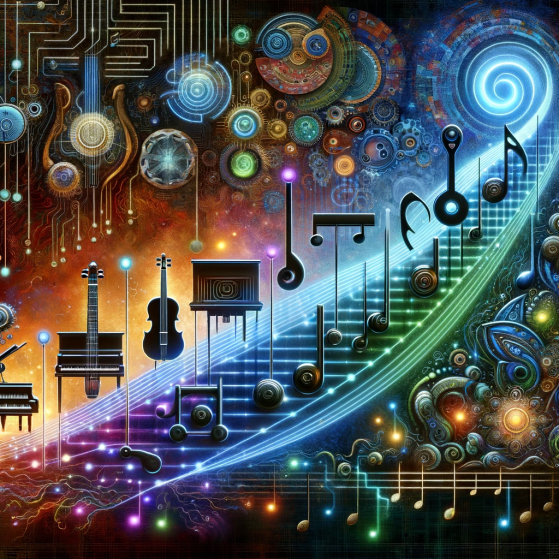
The Unique Human Touch in Music Creation
On the other side of the spectrum, human creativity in music is a combination of emotional expression, cultural influences, personal experiences, and technical skills. Humans possess the innate ability to connect emotionally with music, understanding its nuances and subtleties, something that AI, at least for now, cannot fully replicate.
For example, the sentiments behind a piece of music can often be traced back to a musician’s personal experiences which resonate with listeners. This unique human touch in music creation is still beyond the reach of current AI technology.
Comparing AI and Human Musical Creativity
In comparison, AI may excel in generating music at a remarkable speed and can provide musicians with fresh ideas and inspiration, as well as assist in the composition process. However, despite these advances, AI is still dependent on pre-existing musical data to form its output, meaning it lacks the ability to be truly innovative or to respond to evolving cultural trends in the same way as a human musician would.
Equally important is the emotional connection in music. While AI can mimic musical styles, the genuine soul and emotion that human musicians imprint on their compositions is yet to be achieved by any AI system. This emotional depth and nuanced understanding of music is a fundamental aspect of human creativity that sets it apart from AI-crafted music.
In conclusion, while AI has undoubtedly progressed in terms of technical competence, it does not possess the creative and emotional depths of human musicians. This does not diminish the value of AI in music creation but rather defines its role as an assistant to human creativity, rather than a replacement.
Potential Controversies and Ethical Concerns
Contestation over Intellectual Property Rights
One of the major controversies surrounding AI-crafted music revolves around intellectual property rights. With AI technology, compositions can be produced at an unprecedented rate, potentially flooding the market with original works. The question arises: who owns these compositions?
Is it the developer of the AI, the person operating the software, or does no one hold the copyright, given that the creation was made by a non-human entity? This lack of clarity can lead to significant legal disputes and challenge existing copyright laws.
Job Displacement Fear Among Musicians
While AI holds the potential to democratize music creation, making it more accessible to those who may not traditionally have the resources to pursue it, there is also a significant concern about job displacement among musicians. As AI technology improves and becomes more capable of producing high-quality music independently, there’s a fear that human musicians may become redundant. This could lead to unemployment among musicians and change the landscape of the music industry dramatically.
Ethical Implications of AI-Driven Music Creation
The emergence of AI in music creation also raises several ethical questions. For instance, while AI has the capability to compose original music, it often learns by analyzing and mimicking existing music. This raises concerns about cultural appropriation and authenticity.
If an AI tool, created and operated by individuals outside a particular culture, mimics music specific to that culture, ethical questions arise. Furthermore, the potential for AI to generate lifelike impersonations of artists and their unique styles may result in significant ethical issues.
Future Trends of AI in the Music Industry
Innovation of AI-Enhanced Music Creation and Composition
The creative process of music, traditionally seen as a purely human endeavor, is significantly being impacted by artificial intelligence. AI-based platforms are expected to play an increasingly central role in the creation of melodies, harmonies, rhythms, and even entire songs.
These AI-crafted pieces of music can potentially match the works of great human composers, while also bearing the potential to create entirely new genres of music. While this capability raises inevitable questions about the role of human creativity in an AI-dominated music industry, it also opens up possibilities for fresh and novel musical innovations.
The Evolution of Music Distribution and Recommendation
Artificial intelligence is revolutionizing more than just the composition of music; it is also expected to transform how music is distributed and recommended. These changes are evident in the way music streaming platforms leverage AI to suggest songs to users based on their listening habits.
Future trends predict an enhancement of these recommendation algorithms, leading to a more personalized and immersive listening experience. Additionally, AI is expected to streamline the process of delivering music to different platforms and audiences, thereby optimizing musicians’ outreach efforts.
The Transformation of Music Learning and Training
Another exciting future trend is the use of AI in music education and training. Advances in AI can enable more personalised and efficient learning experiences for aspiring musicians. Tools augmented with AI will assess a student’s performance, provide real-time feedback, and recommend areas of improvement.
This can make music education more accessible to a broader audience, not limited by geography, time, or personal resources. An investment in this technology promises to revolutionize music education, thereby nurturing a new generation of musicians equipped with both traditional and modern skills.

